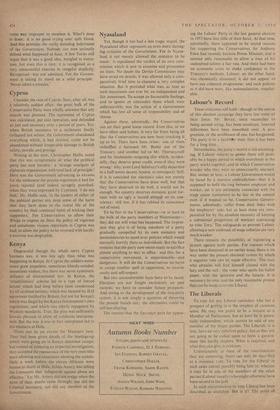Suez We frequently receive letters begging us not to keep
harping on Suez; and it will be reasonable, after this election, whichever way it goes, to cease nagging about it (at least in a political context : it will, of course, continue to provide fascinating material for the professional historian for many years to come). But within the lifetime of the Macmillan Government no such cessation of hostility has been possible; the experience was too traumatic to be forgotten. If the Government had admitted error, that would have been different; but the continued Conservative pretence that Suez wag a good, a noble, a wise venture has been too much to stomach, in view of what has emerged about its origins.
It is laughable to recall that when Harold Mac- millan wrote for the Spectator at the time of the last election; he insisted that 'the primary task [of the free world] must be to forestall aggression.' Even if all the other Conservative arguments in favour of Suez were conceded (not that they could be, as they were so mutually contradictory), it is no longer possible to pretend that the Govern- ment was unaware of Israel's aggressive intentions. Yet Sir Anthony and his colleagues, so far from trying to forestall aggression, deliberately waited until the blow across Sinai was struck, and used it as an excuse to indulge in aggression of their own.
Conservatives are referring to Suez as little as possible: they are almost implying that it is in some way improper to mention it. What's done is done: it is no good crying over spilt blood. And this provides the really damning indictment of the Government. Nobody can now seriously defend what happened at Suez. A few Tories still argue that it was a good idea, bungled in execu- tion, but even this is rare; it is recognised as a very unsuccessful exercise in vengeful duplicity. Recognised—but not admitted. For the Govern- ment is taking its stand on a solid principle : 'Never admit a mistake.'







































 Previous page
Previous page